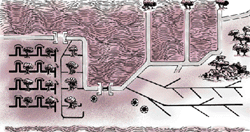The chauka magic
 lapodia is a small village of some 189 families in the Dudu block of Jaipur district in Rajasthan. Located in a semi-arid area, the residents of Lapodia are primarily agro-pastoralists, and their livestock subsists on the pastures in the neighbouring areas. In the past four-five years, the people of this village have regenerated 50 hectares of their degraded pasturelands through an ingenious system called chauka , which relies on storing rainwater in dyked pastures.
lapodia is a small village of some 189 families in the Dudu block of Jaipur district in Rajasthan. Located in a semi-arid area, the residents of Lapodia are primarily agro-pastoralists, and their livestock subsists on the pastures in the neighbouring areas. In the past four-five years, the people of this village have regenerated 50 hectares of their degraded pasturelands through an ingenious system called chauka , which relies on storing rainwater in dyked pastures.
Chauka means a square in Hindi, and the system relies on the construction of dykes in a series of squares that are 14,884 sq metre (see diagram: Ingenuity at work ). The chauka is divided into two equal rectangles. Dykes are built along three sides on the periphery of the rectangle that lies towards the lower part of the land along the gradient. The dykes are 1.5 metres high. Trees are planted on these dykes to give them additional support to withstand rain.
All the rain that falls in the chauka is collected towards the lower half that is dyked. As the amount of water stored by the rectangular enclosure rises, it flows into the neighbouring chauka , and so on. After reaching the last chauka , excess water flows into a monsoon drain along the gradient. "The most important characteristic of the system is that it spreads water evenly over a large area, at the same time ensuring that the amount of water does not rise above the level that prevents the healthy growth of grass,' says Laxman Singh, whose family has lived in Lapodia for generations. Singh adds that the chauka system also promotes the recharge of groundwater.
